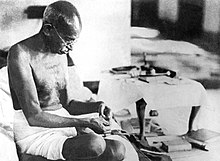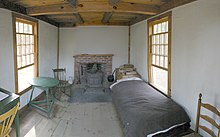1) First, a review of simple living:
Simple living
From Wikipedia, the free encyclopedia
Simple living encompasses a number of different voluntary practices to simplify one's lifestyle. These may include reducing one's possessions or increasing self-sufficiency, for example. Simple living may be characterized by individuals being satisfied with what they need rather than want. Although asceticism generally promotes living simply and refraining from luxury and indulgence, not all proponents of simple living are ascetics. Simple living is distinct from those living in forced poverty, as it is a voluntary lifestyle choice.
Adherents may choose simple living for a variety of personal reasons, such as spirituality, health, increase in quality time for family and friends, work–life balance, personal taste, frugality, or reducing personal ecological footprintand stress. Simple living can also be a reaction to materialism and conspicuous consumption. Some cite socio-political goals aligned with the anti-consumerist or anti-war movements, including conservation, degrowth, social justice, ethnic diversity, tax resistance and sustainable development.
2) Next, further reading finds the ideals of simple living promoted in most religions and cultures:
History
Religious and spiritual
A number of religious and spiritual traditions encourage simple living.Early examples include the Shramana traditions of Iron Age India, Gautama Buddha, and biblical Nazirites (notably John the Baptist).[Jesus himself lived a simple life. In Mark 6,8-9 he tells his disciples "to take nothing for their journey except a staff—no bread, no bag, no money in their belts—but to wear sandals and not put on two tunics." Various notable individuals have claimed that spiritual inspiration led them to a simple living lifestyle, such as Francis of Assisi, Ammon Hennacy, Leo Tolstoy,Rabindranath Tagore, Albert Schweitzer, and Mohandas Gandhi.
Simple living has traditions that stretch back to the Orient, resonating with leaders such as Zarathustra, Buddha, Laozi, and Confucius and was heavily stressed in both Greco-Roman culture andJudeo-Christian ethics. Diogenes of Sinope, a major figure in the ancient Greek philosophy of Cynicism, claimed that a simple life was necessary for virtue, and was said to have lived in a wine jar.
Plain people are Christian groups who have for centuries practiced lifestyles in which some forms of wealth or technology are excluded for religious or philosophical reasons. Groups include the Shakers, Mennonites, Amish, Hutterites, Bruderhof, Harmony Society, and some Quakers. There is a Quaker belief called Testimony of Simplicity that a person ought to live her or his life simply.
Jean-Jacques Rousseau strongly praised the simple life in many of his writings, especially in his Discourse on the Arts and Sciences (1750) and Discourse on Inequality (1754).
The Islamic prophet Mohammed preached the followers of Islam to lead a life of simplicity.
Secular
Epicureanism, based on the teachings of the Athens-based philosopher Epicurus, flourished from about the fourth century BC to the third century AD. Epicureanism upheld the untroubled life as the paradigm of happiness, made possible by carefully considered choices. Specifically, Epicurus pointed out that troubles entailed by maintaining an extravagant lifestyle tend to outweigh the pleasure of partaking in it. He therefore concluded that what is necessary for happiness, bodily comfort, and life itself should be maintained at minimal cost, while all things beyond what is necessary for these should either be tempered by moderation or completely avoided.
Henry David Thoreau, a North American naturalist and author, is often considered to have made the classic secular statement advocating a life of simple and sustainable living in his book Walden (1854). Thoreau conducted a two-year experiment living a plain and simple life on the shores of Walden Pond.
In Victorian Britain, Henry Stephens Salt, an admirer of Thoreau, popularised the idea of "Simplification, the saner method of living".Other British advocates of the simple life included Edward Carpenter, William Morris, and the members of "The Fellowship of the New Life".[14] C.R. Ashbee and his followers also practiced some of these ideas, thus linking simplicity with the Arts and Crafts Movement.British novelist John Cowper Powys advocated the simple life in his 1933 book A Philosophy of Solitude. John Middleton Murry and Max Plowman practised a simple lifestyle at their Adelphi Centre in Essex in the 1930s. Irish poet Patrick Kavanagh championed a "right simplicity" philosophy based on ruralism in some of his work.
George Lorenzo Noyes, a naturalist, mineralogist, development critic, writer, and artist, is known as the Thoreau of Maine. He lived a wilderness lifestyle, advocating through his creative work a simple life and reverence for nature. During the 1920s and 1930s, the Vanderbilt Agrarians of the Southern United States advocated a lifestyle and culture centered upon traditional and sustainable agrarian values as opposed to the progressive urbanindustrialism which dominated the Western world at that time.
Thorstein Veblen warned against the conspicuous consumption of the materialistic society with The Theory of the Leisure Class (1899); Richard Gregg coined the term "voluntary simplicity" in The Value of Voluntary Simplicity(1936). From the 1920s, a number of modern authors articulated both the theory and practice of living simply, among them Gandhian Richard Gregg, economists Ralph Borsodi and Scott Nearing, anthropologist-poet Gary Snyder, and utopian fiction writer Ernest Callenbach. E. F. Schumacher argued against the notion that "bigger is better" in Small Is Beautiful (1973); and Duane Elgin continued the promotion of the simple life in Voluntary Simplicity (1981). The Australian academic Ted Trainer practices and writes about simplicity.
3) My conclusion?? The reasons for simple living are as varied as the countries where it is practiced, or even what it is called. (I personally like "down-shifting".) We are definitely not alone.




No comments:
Post a Comment